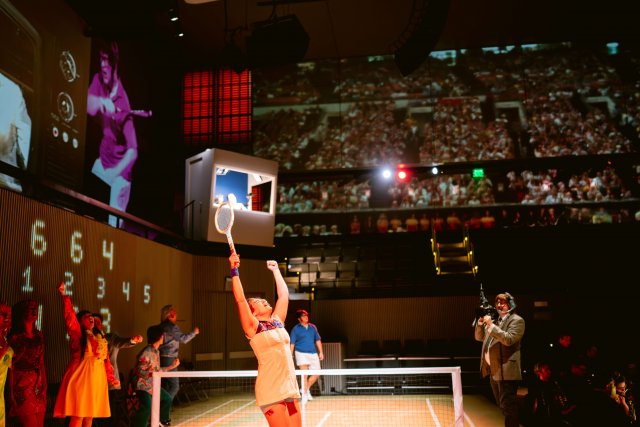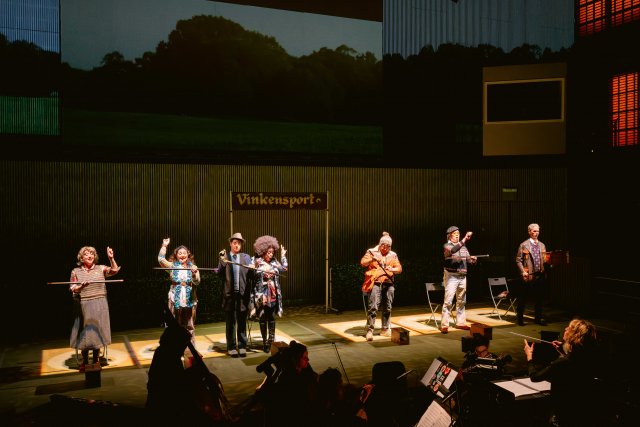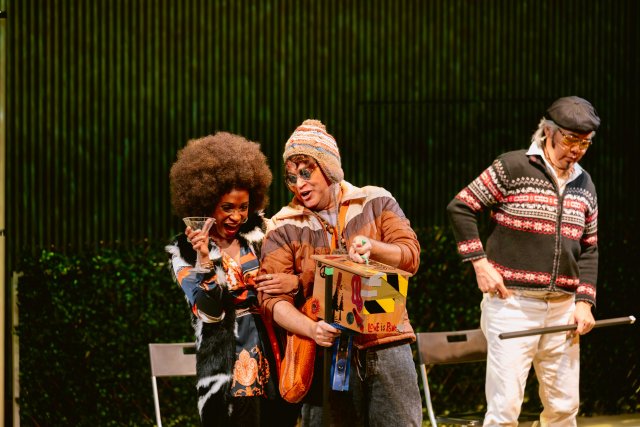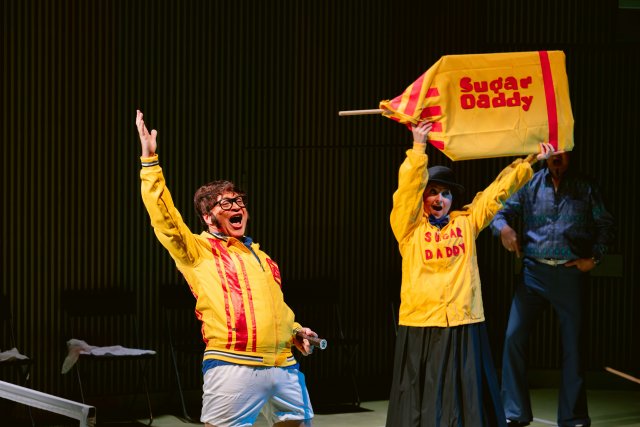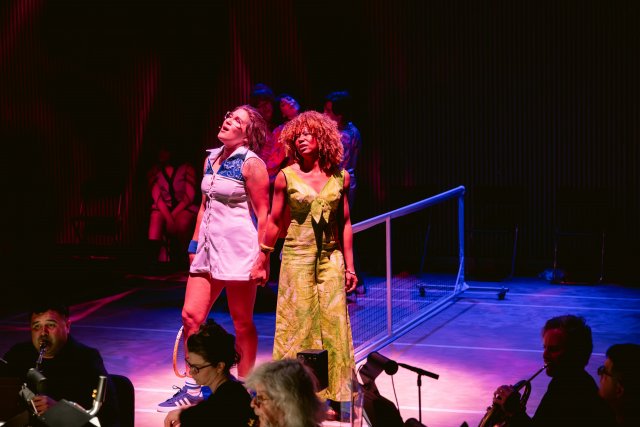Birds and Balls
Two Lively One-Act Operas From Innovative Opera Parallèle
By: Victor Cordell - Apr 07, 2024
You might wonder what the 500-year-old Belgian tradition of counting the frequency that birds repeat their call and a 20th century tennis match have to do with one another. Well, both are/were esteemed competitions represented in one-act operas produced by the ever-inventive Opera Parallèle at SF Jazz, the latter piece holding its world premiere.
The unifying conceit is that a non-singing “Howard Cosell” announces the contests as ABC Wide World of Sports broadcasts. The result is a highly amusing and entertaining, if untraditional, night at the opera.
“Vinkensport, or the Finch Opera” provides an incisive look into this unique Belgian activity. In a nod to Cosellism, that character refers to the outcome of the match as “the trill of victory, and the agony of the tweet!” Birding might seem to be the last refuge from vicious competition. Regardless, in trying to induce the greatest number of song repeats by one-ounce, opera-diva chaffinches in the prescribed time, owners have abused their birds in oh so many ways.
Banned in large measure because of a Thomas Hardy poem decrying the practice, finches were formerly blinded so that their singing would be more focused. Also as implied or expressed in the opera, real-life competitors have used hidden tape recorders to fudge the numbers; injected birds with various drugs to give them more strength and stamina; and used artificial light to induce them to perceive the spring mating season at the time of the competition.
Award-winning modern music composer David T. Little has produced an accessible musical score that bridges opera and rock sensibilities but with limited vocal challenges. Given his background as a drummer, the percussive nature of the music is no surprise, but the rhythm comes from tonal instruments, including marimba and vibes. The counting of the songs is noted by a recurring “tick, tick, tick, tally,” but we don’t hear the imitated sounds of the birds.
For such a brief opera, librettist Royce Vavrek reveals not just the nature of the competition, but also unmasks the competitors. On the surface, the people and the situations seem amiable, even laughable, but many challengers are loners or losers. The narrative discloses backstories, subtexts, and discontent as they take turns exposing their thoughts, often aloud through anthropomorphizing their birds. Indeed, we learn the names of the birds, but not the people.
For instance, one female competitor had found her husband in flagrante delicto. Now, one of the male competitors considers her a stalker, but he toils in loneliness as expressed in his closing aria. Another felt abandoned as a child because of his father’s love of vinkensport, but he competes even though he expresses hate for it.
The ensemble cast deftly adopts the personalities of these quirky characters. They act and sing their clumsy interactions and inner feelings with big heart and fine voices.
Like many undertakings in life, the opera discloses that what becomes an obsession for some carries no importance whatsoever to most of society around them. Although the stakes are low in this opera, the offbeat and unfamiliar topic; interesting character representations; dark humor; and light music make for a worthwhile time spent.
Unlike the unassuming unknowns from the previous opera, “Balls” brims with brio in recounting the “Battle of the Sexes.” This highly publicized 1973 tennis match between Bobby Riggs and Billy Jean King would attract the largest viewership of any tennis match ever. The lively opera shows Riggs’ taunting and braggadocio; the media frenzy with television interviews; and even the over-the-top pageantry with King being conveyed to the court in a palanquin to the strains of the “Triumphal March from Aida,” while Riggs arrives as an advertisement, displaying the yellow and red livery of Sugar Daddy candy bars.
A multiple award winner in multiple musical idioms, composer Laura Karpman keeps the audience guessing what’s next with a wide range of genres from bouncy pop and bluesy blues to operatic-style arias. She also uses all manner of ensembles to enrich the sound as well as a capella supported by syncopated clapping by the orchestra. This mix of non-operatic styles may not suit traditionalists, but should satisfy those looking for freshness and variety.
Nikola Printz excels with confidence and elan as Billy Jean King, able to maintain a steady and rich mezzo voice even while flailing away with a tennis racquet. Nathan Granner is Printz’s equal as Riggs, clowning and voicing profound gruffness, as he did in “Vinkensport…..” as well, which depicts great passion, but doesn’t it hurt his throat?
In addition to the competition of the tennis match itself, undercurrents add to the complexity of Gail Collins’ libretto. Feminism is an agenda item, as King was motivated by women’s rights to accept Riggs’ challenge. But the composer also wanted to reveal King’s lesbian relationship with Marilyn Barnett, winsomely portrayed by soprano Tiffany Austin, who dreamily sings a blues ballad about hoping to share a house in Malibu with King.
The binding of these two operas with Wide World of Sports framing and the incidental connective music to allow them to show without a break are just the beginning of the ingenuity of Creative Director Brian Staufenbiel and Artistic Director & Conductor Nicole Paiement. Staufenbiel’s multimedia scenic design with David Murakami’s projections is one more step taken by this team in the enhancement of conventional opera with electronic elements, following their innovations with “Everest” and “La Belle et le Bête.” In this program, the backstories of characters in “Vinkensport…..” are shown in bigger-than-life projection videos. In “Balls” they are used for historic footage, period advertisements, and extensions of the sporting arena.
As usual, Paiement conducts with decisiveness and enthusiasm the two different orchestras for the operas. But more than that, she and the whole production team seem to have fun with this undertaking. They deserve to have pleasure, and they still give it back to the audience in a most enjoyable experience.
“Vinkensport, or the Finch Opera,” composed by David T. Little with libretto by Royce Vavrek plus “Balls,” a world premiere composed by Laura Karpman with libretto by Gail Collins are produced by Opera Parallèle and perform at SF Jazz, 201 Franklin Street, San Francisco, CA through April 7, 2024.

